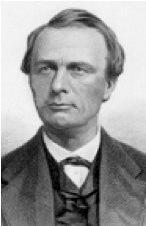
An interesting but lengthy book that is worth checking out for anyone who is interested in the history and beliefs of the Universalist Church of America in the 1800s is an autobiographical work titled “Twenty-Five Years in the West” by Erasmus Manford (1815-1884). Manford was a traveling Universalist preacher and debater who presented his ideas in quite a few different states, such as Pennsylvania, Ohio, Illinois, Louisiana, Mississippi, among others. Manford was most well-known for publishing his short work “One Hundred and Fifty Reasons for Believing in the Final Salvation of All Mankind”
His lengthier “Twenty-Five Years in the West,” however, details many of his debates and discussions with people of different denominations. It is also an interesting look at the history and developments of the United States in the mid-1800s, as he describes the conditions of the various cities and towns he visited. Written in the style of a personal, informal journal, the book covers many years and many locations, and a large cast of characters is introduced. Manford relates his encounters with Abraham Lincoln, Native Americans in the countryside, Dunkards (a now largely forgotten denomination), and quite a few “Partialist” preachers.
The work uses a handful of terms that were unique to the Universalist denomination in those days. “Partialism” was used to mean any view that held that some people would be lost forever (whether in everlasting torment or annihilation). “Orthodoxy” (not referring to the Eastern Orthodox Church) was often utilized derogatively to mean the beliefs of the various denominations that the Universalists disagreed with. And Manford employed many terms to denote universal salvation, often capitalized, such as “the Great Salvation,” “the Restitution,” “the faith of God’s Universal Grace,” and others.
Manford believed that universalism was the most consistent understanding of God’s love and sovereignty, and that universalist theology could lead to a unification of Arminian and Calvinist groups by bringing their best ideas together. In this way, he was a bit like Elhanan Winchester before him or philosopher Thomas Talbott and Dr. Boyd Purcell of today.
Manford wrote:
I believe in all the truth there is in Arminianism and Calvinism, and there is some truth in both systems. Calvinism says, that all God wills to save will surely be saved — not one lost. Very good; I can say, amen to that. Arminianism says, that God wills the salvation of all. Very good; I can say, amen to that. I will put these two truths, and the sequence from them, in the form of a sylogism:
1. Arminianism – It is God’s will, that all men shall be saved.
2. Calvinism – God’s will shall be done.
3. Conclusion – All will be saved.
I cast aside the dross of Calvinism and Arminianism, and retain the pure gold of both systems (p. 158).
Erasmus Manford, debater that he was, loved to lay out concise and ordered arguments against his theological opponents:
Returning to St. Louis, I lectured in Lebanon, and a man said the sentiments I advocated lead through Deism to Atheism. How is that? I replied. I am with the New Testament in believing in a God for ALL, and a Savior for all. Is there any Deism or Atheism in that? Orthodoxy is the first step downward, for it teaches a God for All, but a Savior for PART. It makes the first departure from the gospel. Deism is another step in the same direction, for it says a God for all, but a Savior for NONE. Atheism is at the foot of the ladder, for it proclaims a God for NONE, a Savior for NONE. There are, then, three downward steps from Christianity or Universalism, to Atheism — ALL — PART — NONE. Orthodoxy is the half-way house between Universalism and Infidelity (p. 258-259).
Perhaps as a sign of the times he lived in, temperance was very important to Manford as well. He would occasionally lecture on the dangers of liquor and alcohol abuse. Interestingly, although the vast majority of the book is focused on his traveling to preach or debate in favor of universal salvation, the last line of the book finishes with a final nod toward temperance: “One more personal remark — I never snuffed, chewed, or smoked tobacco; neither did I ever poison my body or my soul with a glass of liquor — do not know whisky from brandy, and do not covet the knowledge” (p. 359).
“Twenty-Five Years in the West” is a fascinating look at the life and work of a tireless preacher in the 1800s, who proclaimed consistently (and often to the annoyance of his hearers!) that God would save every last person and that someday everyone would be holy and happy.
“Twenty-Five Years in the West” can be found for free online here: https://books.google.com.bo/books/about/Twenty_five_Years_in_the_West.html?id=ztUyAQAAMAAJ&redir_esc=y

I’m an octogenarian in North Texas.
As a child I was Presbyterian. I knew God loved me. And felt His presence there. In my teens I joined FBC Dallas a fundalmentalist strict church. With heavy witnessing classes. It was our Duty to witness..
The anxiety I felt thinking it was my responsibility to convert people was overwhelming.
And the dogmatic “Accept Jesus or u will Fry.”..harsh judgemental attitudes….spun me into anguish.
In my 30’S I left that denomination.
Yrs later I remarried and moved to a rural area where I became an active Methodist. I loved it…because it was a practical, community oriented …loving people into God’s kingdom .
No eschatology, rapture, 2nd coming terrifying focus.or Biblical thinking about how many angels danced on the head of a pin..mentality
Universalism intrigues me bc it appears to focus on the character of God’s Love. Which is my main focus.
I understand many issues and beliefs about hell. But to wave firey flames terrifying people of an endless abyss of torture is forigen to the Love Jesus portrayed.
For me that indoctrination was harmful .
I’m delighted to know about Universalism and the marvelous influence it has to know there is a wideness in God’s Mercy and boundless Love.
Thank you
Thank you, Steven, for this review. and what a great idea, to review little-known books on universalism written by early universalists!
It is a huge mistake to think that one can take the “best” of what Arminianism and Calvinism have to offer to get to the truth. I am sorry, but two wrongsn do not make a right… not for humans… To use Apostle Paul’s own words, “A little leaven is leavening the whole kneading.” Galatians 5:9. Or, we can use my own words, in form of a sylogism:
1. Arminianism: A God who will not save because he is UNABLE (the fallacy of “human free will:)
2. Calvinism: A God who will not save because he is UNWILLING (the fallacy of “predestination”)
3. Conclusion: Such “God” is NO GOD AT ALL.
Such false theologies and the evil persons who promote them “must be gagged,” as Apostle Paul taught. Titus 1:11
https://goedbericht.nl/english/
This is the climax of Paul’s testimony. He started with the statement that God wants all people to be saved and to realize (that) truth. For since there is one God, He is the God of all and through the man Christ Jesus He will realize this. For he gives himself as a ransom for all. Here again: all mankind.